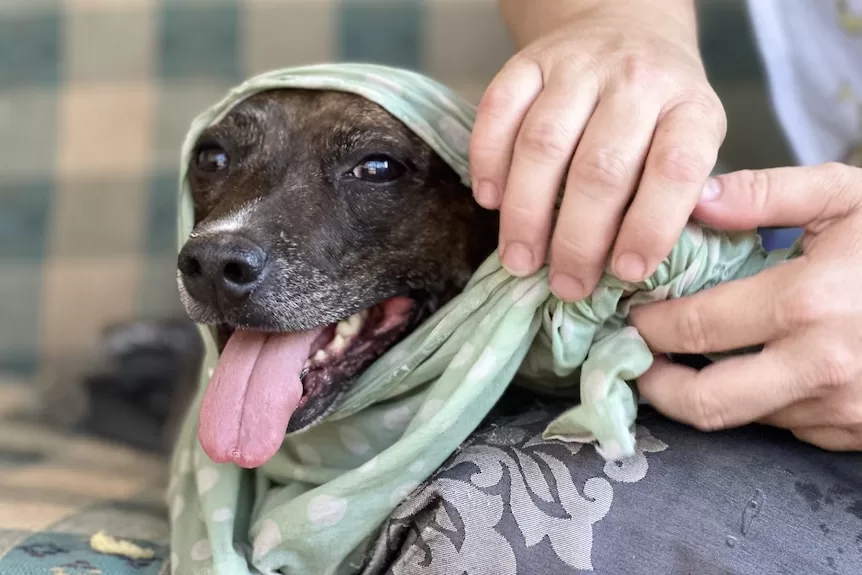Alys McDonough rubs her face with a wet cloth and then proceeds to wrap her panting dog.
“This is my air conditioning; it’s called muslin cloth,” she exclaims proudly.
Her home in Norseman, a boom-and-bust WA town at the edge of the Nullarbor, does not have air conditioning.
It’s 42 degrees Celsius and the tin roof and windows glisten under the scorching sun.
The house is not connected to grid power, and, to get water, Alys has to venture into the backyard.
“It’s sort of like camping, only you have a roof over your head,” she says.
Just not a full ceiling.
“We are missing a bit of roof,” Alys says, pointing upwards. “But that’s OK, we are going to fix it with some cardboard.”
She couldn’t afford a plumber or an electrician, but, armed with posters, old bed sheets and a sense of humour sharpened by her old comedy producing job, Alys made things work for herself.
Unintentionally off grid
“Most people would like to have a ceiling, most people would like to have some aircon, most people would like running water, which I sort of have,” Alys concedes.
But all she says she needs is the sun.
When the electrician told her it was not possible to connect the house to power, the Aussie battler did not dismay.
“I just watched about 10 series of Alone before I had this happening,” Alys explains.
“So I had a bit of context.”
She got portable solar panels, power batteries and dehydrated meals.
It was not by choice, but Alys embraced the off-grid lifestyle.
She says she’s “thrilled” not to have grid power, and bills.
“Power, not a problem. Money… if I could grow money by pointing a solar panel at the sky, I would love that.”
A tin-changer from Sydney
Money has always been a source of stress for Alys, and the reason behind her move from Sydney to outback Western Australia.
“All my money was going on rent, and I just wanted to stop paying rent,” she says.
“I did an internet search, and I found the cheapest house in Australia, which was this.”
With a first home owner grant and $5,000, in 2007, Alys bought her Norseman house for $11,750.
She affectionately refers to as “a bit of a fixer upper”.
It might have been one of the cheapest houses at the time, but there are still many vacant properties on the market.
Unoccupied homes
The Regional Australia Institute says there are more than 500,000 unoccupied homes in the regions, many in need of updates.
“There is a real call to update properties and make sure they are at the standard with which they can be utilised,” chief executive Liz Ritchie says.
Another call, that of lower costs, is proving irresistible for people like Alys, who are abandoning capital cities for the regions.
That trend is up 12 per cent on pre-pandemic levels and Liz says it’s going to hold.
“Citizens are looking for a different way to live, a different way to work; they are looking for new models,” she says.
Alys found hers in outback WA, in Norseman, “a world of its own”.
“I’m sorted, I have a home, it doesn’t matter where it is,” Alys says.
Buying the house back
Alys eventually decided to give city life another go and, in 2012, she sold her home and moved to Perth.
But, when she had to leave her rental, about a year ago, she faced becoming homeless.
Paying more than $500 or $600 a week was not an option.
“Given I had a dog and me and limited funds I thought: ‘What can I do?'” she recounts.
“I thought I’d buy my house back and then I don’t have to worry about this worsening real estate situation.”
‘Pressure lifted’
Alys spent all her savings, about $12,500, to buy the house back and there are a few things she doesn’t have.
But she’s glad they include a mortgage, rent, bills, real estate agents and getting yelled at by customers in a job she hates.
“Working a job or two jobs and all that money going on rent and other expenses, it’s not good for one’s mental health,” she says.
“When you don’t have to worry about all that stuff, there’s a lot of pressure that has been lifted.”
Struggling to cope with the housing and cost of living crisis, Alys found a solar-powered light at the end of tunnel.
She’s happy working from home, doing transcribing and selling items online.
Only one thing is making her sad: not being able to afford a Netflix subscription to watch RuPaul.
